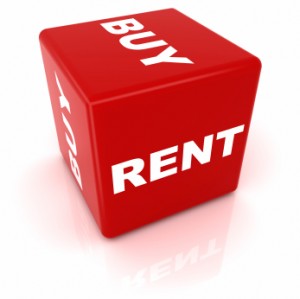One of the biggest misconceptions for first-time homebuyers is how much you’ll need to save…
Reasons to Stop Renting and Buy a House
By Patrick Merryman
Opinions about home ownership vary from person-to-person. And while some view buying a home 
Understandably, renting can be beneficial if you don’t like to stay in one place for too long. As a renter, relocation can be as simple as giving your landlord a 30-days notice when your lease is about to expire. This living situation also works if you don’t want to deal with home maintenance. Since it’s not your house, it’s not your responsibility to pay for repairs and routine maintenance.
In spite of the fact that renting offers greater flexibility, the benefits of renting don’t always compare with the benefits of owning. If you’re on the fence about whether to own, here are five reasons to stop renting and buy a home.
1. Flexible Loan Options for Applicants with Lower Credit Scores
Conventional mortgage lenders require a minimum credit score between 680 and 700. If your credit score is lower than the required minimum, you may feel that renting is your only option at this time. However, it is possible to purchase a house with a lower score.
Now, while you won’t be able to acquire a conventional mortgage, but you may qualify for a home loan insured by the Federal Housing Administration. These loans have flexible credit requirements and you only need a credit score of 620.
2. Low Down Payment Options
You may shrug off buying a house if you do not have a large cash reserve. However, buying a home no longer requires the traditional 20% down payment.
If you have a good credit history and you meet the mortgage lender’s credit requirements, you can purchase a home with a down payment as little as 3.5% or 5%, depending on whether you select an FHA or a conventional mortgage loan. If you’re eligible for a VA home loan, you can purchase with no money down.
3. Opportunity to Build Equity
Renting is often described as “flushing money down the toilet” – there’s truth behind the statement. Every rent payment goes into your landlord’s pocket, and you get nothing in return – financially speaking. It’s a different story when you buy a house.
Each mortgage payment you make helps pay down the mortgage balance, and as your home increases in value, you build equity. Equity is the difference between your home’s value and what you owe the mortgage lender. It is “part of the home’s value that you can truly say that you own,” according to Bankrate.
There is no equity in renting. You can spend thousands of dollars in rent payments each year, yet you’ll never own a stake in the property.
4. Fixed Monthly Payments
Your rent payments may be affordable this year, but they can go up next year and every year thereafter. On average, rent payments increase about 3.9% a year. This may seem like a manageable increase, but it can add up over the years.
If you buy a house and receive a fixed rate mortgage, you will enjoy predictable payments for the duration of your mortgage term.
5. Mortgage Rates are Slowly Increasing
You can put off buying a house for a few more years, but you may miss the opportunity to snag a historically low interest rate.
The interest rate is the fee you pay for borrowing money; and the higher your mortgage rate, the higher your monthly payments. Interest rates constantly fluctuate, and unfortunately, low mortgage rates don’t last forever. If you want to take advantage of low rates, now’s the time to buy.
Bottom Line
In the end, only you can decide whether to buy or rent. It’s smart to postpone ownership if you need to improve your credit or if you don’t have a down payment. However, if you currently meet a lender’s requirements and you have a cash reserve, buying your first place may result in a cheaper housing payment and provide the stability you deserve.

